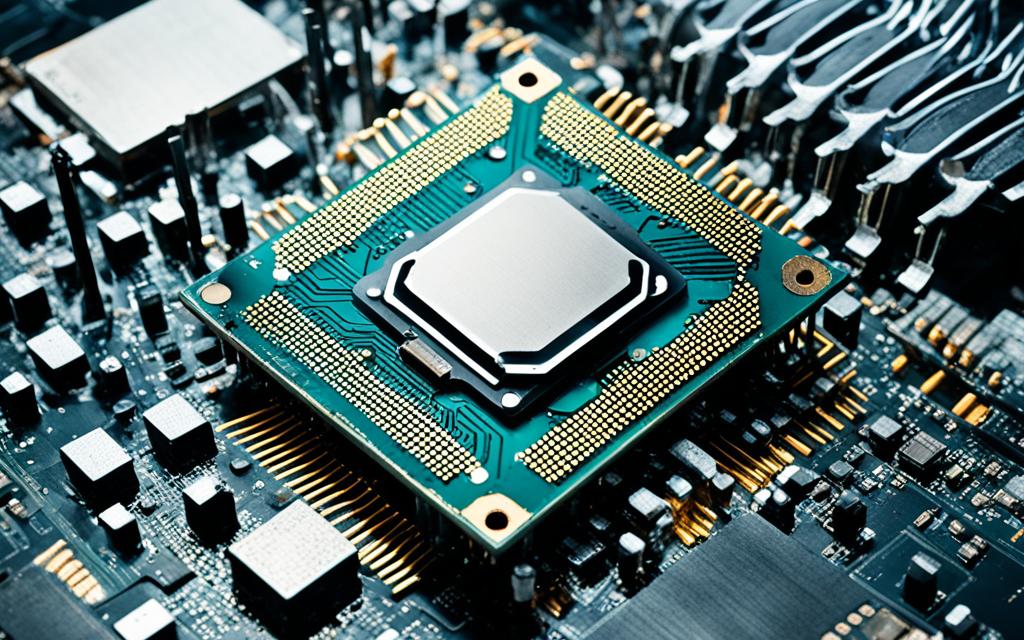Table of Contents
In today’s fast world, knowing the signs of CPU damage from overheating is key. Overheating usually happens when the cooling system can’t keep the hardware cool1. Be on the lookout for signs like sudden shutdowns, system crashes, and boot failures. These could mean serious CPU issues1.
Keeping an eye on CPU temperatures helps catch problems early. This can prevent major damage, saving your device’s performance and life. So, don’t ignore the health of your CPU. Ignoring it could lead to big problems that harm your computer experience.
Key Takeaways
- Be aware of common overheating signs such as unexpected shutdowns and performance issues.
- Ensure regular monitoring of your CPU’s operational temperatures to prevent damage.
- Regular maintenance, including dust cleaning and airflow enhancement, is key.
- Recognise high temperature readings as critical warning signals for potential damage.
- Seek professional help if you suspect serious CPU damage due to overheating.
Understanding CPU Overheating
CPU overheating is common, especially during intense tasks like gaming. Knowing why CPUs overheat is key to keeping them cool. This knowledge helps users prevent overheating and enhance their system’s durability.
Common Causes of CPU Overheating
Many things can make CPUs overheat. These include:
- Running many processes at once, which uses too much resource.
- Having too many browser tabs open or apps that don’t respond, stressing the CPU.
- Fans not working right or air vents being blocked, which stops good airflow.
- Dust building up, which blocks cooling systems.
- Old thermal paste, reducing heat transfer.
Cleaning your computer is crucial. Doing so every six months boosts speed, performance, and airflow. This helps keep CPU temperatures down2. Using laptops on soft surfaces can block vents and create more heat3. A good work environment is important for cooling your CPU effectively.
How Environmental Factors Contribute
The surrounding environment affects CPU performance greatly. Room temperature and humidity can change how hot your CPU gets. For example:
- A notebook CPU’s best temperature is around 30 degrees Celsius above room temperature4.
- Keeping computers on flat, hard surfaces helps with airflow3.
- Too much heat in a room can push the CPU past safe limits, over 85 degrees Celsius4.
It’s important to keep an eye on these factors to reduce their effects on CPU performance.
Symptoms Indicating CPU Overheating
The symptoms of CPU overheating are easy to notice. You might see your computer slowing down or crashing often. These are called CPU performance issues. A CPU temperature above 80°C (176°F) can cause big problems5. High fan noises suggest the cooling system is struggling due to overheating6. A safe CPU temperature is below 60°C. Anything above 80°C requires close watching4.
If your computer feels hot or shows high temperatures when not doing much, pay attention. Use software to keep an eye on temperature and CPU health regularly. Blue screen errors and fake virus alerts might also signal overheating. It highlights why checking your system often is key.
Sometimes, mild symptoms can lead to big issues like data loss. Knowing these signs early helps prevent major damage. By monitoring well and understanding overheating diagnostics, you can keep your computer running smoothly.
| Temperature Range (°C) | Status |
|---|---|
| Under 60 | Good |
| 60 – 70 | Running okay |
| 70 – 80 | Maybe okay if overclocking |
| 80 – 90 | Not good |
| Above 90 | Warning |
How to Check CPU Temperature
To stop your CPU from getting too hot, it’s key to check CPU temperature often. There are trustworthy CPU temperature monitoring tools for this, such as HWMonitor and Core Temp. They give you real-time temperature info and other important details.
Keeping your CPU cool, below 60°C (140°F), helps it work best. When gaming or doing heavy tasks, CPU temps can hit 70° to 85°C (158°F to 185°F). If it goes over 90°C (194°F), there’s a risk of harm to your computer78. Watching your CPU’s heat is vital during intense use or gaming to avoid system crashes or damage.
If you can’t use software, try physical checks. Feeling your computer’s case for too much heat can clue you in on overheating. Aim to keep the CPU cool, between 40–65°C (104–149°F) for daily tasks8. For heavy uses, knowing about thermal paste and the need for better CPU coolers is helpful.
Regularly clean inside your computer to ensure good airflow, as dirt buildup leads to overheating. And, consider a laptop stand to boost airflow for portable devices, keeping CPU temperature in check7. These steps can help you control your CPU’s heat, making your system last longer.
Preventing CPU Overheating
It’s vital to keep your CPU cool to make it last longer and work better. Regularly removing dust is key because it can clog up fans and vents, stopping air from moving freely. By fixing cables better and keeping vents clear, your system’s airflow improves. If your computer gets very hot, try using extra fans or even place it differently for better air movement.
Always watch your CPU’s temperature with tools like CAM software. They can spot when it’s getting too hot because of old or failing coolers. For those pushing their PCs hard, upgrading your cooling with water kits or bespoke options can really boost performance.
A good setup of case fans helps in replacing warm air inside with cool air from outside. Listen for any strange noises from your fans as this means something might be wrong. A cooling system that works well is essential to stop your CPU from getting too hot.
Keeping air paths clean is also smart, ensuring nothing blocks the cool air flow. Using your internet browser in a smart way can also lessen the strain on your PC, lowering heat build-up. If your computer starts making a lot of noise or slows down because it’s too hot, fix it quickly to prevent damage.147890p>
| Cooling Mechanism | Advantages | Disadvantages |
|---|---|---|
| AIO Coolers | Good performance, aesthetic appeal | Limited lifespan, potential pump issues |
| Air Coolers | Cost-effective, reliable | Less efficient for high-performance tasks |
| Water-Cooling Kits | Advanced cooling for overclocking | Higher implementation costs, complexity |
Finally, don’t push your CPU too hard without the right cooling, as it adds stress. With the right cooling solutions, your CPU can work better, longer. For more on fixing CPU heat problems, check this out: understanding the reasons and effective fixes9.
Fixing an Overheated CPU
If your CPU is overheating, act fast to fix CPU overheating. Make sure CPU coolers are tightly fixed. Also, check that the thermal paste is correctly applied. Wrongly applied paste can block heat from moving away, making the CPU too hot4. If it still overheats, try changing your BIOS settings to manage power better2.
Lowering CPU use can help during troubleshooting. This makes it easier to spot apps that overload your CPU2. If cooling parts are broken, you might need new ones or even a new system. Cooling pads can also help, especially for laptops, by spreading the heat4.
After fixing it, keep an eye on CPU use. Regular device cleaning stops dust build-up and improves air flow. Good ventilation is vital to avoid overheating again2. By taking these steps, you reduce overheating risks and your computer works better for longer.
Find out how to tackle CPU issues effectively at more about troubleshooting CPUissues and effective solutions
FAQ
What are the common signs of CPU damage from overheating?
Overheating CPUs can shut down unexpectedly. They may work slowly or show blue screen errors. Spotting these signs early helps avoid serious damage.
What are the principal causes of CPU overheating?
CPUs overheat due to many reasons. Poor cooling, bad airflow, dust, and bad thermal paste application are common causes. Overclocking and high room temperatures also play a part.
How does the environment affect CPU cooling?
The environment plays a big role in CPU cooling. Humidity and room temperature can raise CPU temperatures if not controlled well.
What are the key symptoms indicating CPU overheating?
Overheating CPUs may crash, restart randomly, or make unusual fan noises. A drop in performance is another key symptom. Early recognition is vital to prevent damage.
How can I check my CPU temperature?
You can monitor your CPU temperature with tools like HWMonitor and Core Temp. They offer real-time CPU temperature data. This helps with overheating checks.
What preventive measures can be taken to avoid CPU overheating?
To stop overheating, keep your surroundings clean. Better cable management improves airflow. Make sure cooling is adequate and refresh old thermal paste. These steps will keep your CPU in good shape.
What should I do if my CPU has already overheated?
If your CPU is too hot, first tighten its cooler. Apply new thermal paste. You might need to reset the BIOS. Sometimes, replacing cooling parts is necessary to solve overheating.
How can I monitor my CPU’s performance post-repair?
After fixing your CPU, use temperature monitoring software. This helps you watch your CPU’s performance closely. Regular monitoring can catch issues to ensure your CPU works well long-term.
Source Links
- https://www.ituonline.com/blogs/troubleshoot-computer-hardware-problems-computer-overheating/ – Troubleshoot Computer Hardware Problems : Computer Overheating – ITU Online
- https://www.avg.com/en/signal/computer-overheating-fix – Why Your PC Is Overheating and How to Fix It
- https://www.avast.com/c-fix-computer-overheating – Why Is Your Computer Overheating and How to Cool It Down
- https://www.drivereasy.com/knowledge/how-to-know-your-cpu-overheating-and-fix-prevent-it/ – How to Know Your CPU Overheating and How to Fix It – Driver Easy
- https://www.linkedin.com/advice/0/what-common-causes-symptoms-cpu-overheating-skills-computer-repair – What are the common causes and symptoms of CPU overheating?
- https://us.norton.com/blog/how-to/why-is-my-computer-overheating – Why is my computer overheating? + How to fix it – Norton
- https://www.pandasecurity.com/en/mediacenter/how-to-check-cpu-temp/ – How to Check Your CPU Temperature – Panda Security
- https://www.avast.com/c-how-to-check-cpu-temperature – How to Check and Monitor Your CPU Temperature
- https://forum.level1techs.com/t/cpu-overheating-how-screwed-am-i/201919 – CPU overheating, how screwed am I?








